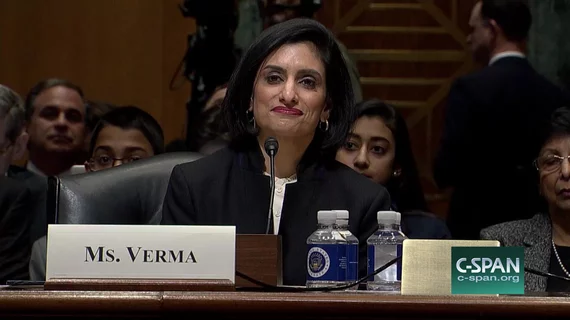CMS’s Verma suggests upside-only ACOs ‘are not producing results’
In her remarks at the American Hospital Association’s annual meeting, CMS Administrator Seema Verma, MPH, offered some criticism of current accountable care organizations (ACOs) that haven’t taken on downside risk, hinting those payment models may be targeted by CMS regulations.
Her speech focused on the commitment to value-based care from her and HHS Secretary Alex Azar, both in existing models and in new experiments “that align with our principles.” One set of models left over from the Obama administration which has particularly attracted their attention, Verma said, has been ACOs.
She applauded the ACOs which have taken on downside risk, saying they’ve “shown significant savings to the Medicare program while advancing quality.” The majority of ACOs, however, have stuck to upside-only models where they don’t risk losing money if costs increase relative to benchmarks but can share in any savings they achieve.
“And even more concerning, these ACOs are actually increasing Medicare spending, and the presence of these upside-only tracks may be encouraging consolidation in the market place, reducing competition and choice for our beneficiaries,” Verma said in her AHA remarks. “While we understand that systems need time to adjust, our system cannot afford to continue with models that are not producing results.”
Two-sided risk models have become slightly more popular, accounting for 18 percent of all participants in the Medicare Shared Savings Program for 2018. But the trend towards risk has been slow and unsteady, with the two-sided Next Generation ACO model losing participants earlier this year, even as the 5 percent bonus payment as an Advanced Alternative Payment Model has been shown to financially benefit organizations that take on risk.
While some groups report providers are preparing for downside risk, the greater push has been to give organizations more time in upside-only models. The AHA itself argued CMS should expand its definition of “downside risk” to include investments made by providers.
Upside-only ACOs in MSSP are supposed to move towards two-sided models after two agreement periods in the program. For those which joined in 2012 or 2013, this would mean they have to advance to the riskier models next year, but the National Association of ACOs (NAACOS), along with other groups like the American Medical Association and the Medical Group Management Association, have asked CMS to let those ACOs stay in the upside-only tracks.
“Transforming care delivery and achieving successful payment reform is a long road. Let’s keep ACOs on the right path by allowing those that demonstrate results in cost and/or quality to remain in a one-sided model for at least one more contract term,” said Clif Gaus, ScD, MHA, president and CEO of NAACOS.
If Verma enforces that rule and won’t allow ACOs to stay in the upside-only tracks, most organizations will just leave MSSP altogether, according to a NAACOS survey. The program is voluntary and Verma’s CMS has taken a stance against mandating participation in any payment model after scrapping mandatory bundled payment projects left over from the Obama administration.
In a direct response to Verma’s comments, NAACOS’ vice president of policy, Allison Brennan, told HealthExec that there are problems in how CMS evaluates ACOs based on historical spending benchmarks rather than calculating what spending levels would exist without ACOs. The group supports two-sided ACO models but Brennan said upside-only ACOs have achieved high quality care while improving financial performance over time.
“We are disappointed in the tone of the conversation around one-sided ACOs in (MSSP),” Brennan said. “While certain policy makers emphasize the role of two-sided ACOs, it’s important to note that the vast majority started out as one-sided ACOs and only after their initial learning curve and successful development in Track 1 were they ready to move to risk-based models.”

